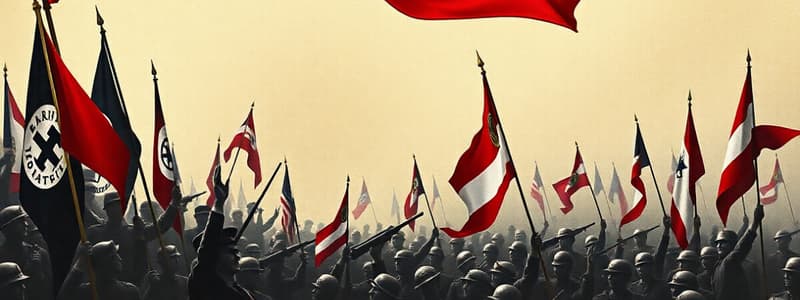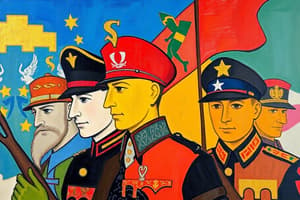Podcast
Questions and Answers
Considering Kaiser Wilhelm II's leadership style and foreign policy objectives, what was the most significant long-term consequence of his decision to let the treaty with Russia lapse in 1890?
Considering Kaiser Wilhelm II's leadership style and foreign policy objectives, what was the most significant long-term consequence of his decision to let the treaty with Russia lapse in 1890?
- It created an opportunity for Austria-Hungary to exert greater influence in the Balkans.
- It allowed Germany to focus exclusively on naval expansion and colonial acquisitions.
- It prompted Russia to form a defensive alliance with France, creating a potential two-front war for Germany. (correct)
- It directly led to the immediate outbreak of war between Germany and Great Britain.
Which statement best evaluates the claim that nationalism was primarily a unifying force in pre-World War I Europe?
Which statement best evaluates the claim that nationalism was primarily a unifying force in pre-World War I Europe?
- Nationalism could unify a country, but also created intense competition and rivalries among nations, especially concerning territorial disputes and imperial ambitions. (correct)
- Nationalism had no significant impact on international relations because economic factors were the primary drivers of conflict.
- Nationalism was solely a destabilizing factor, leading directly to the dissolution of empires and widespread conflict.
- Nationalism uniformly fostered unity and cooperation among all European nations due to shared cultural values.
How did the system of alliances contribute most directly to the escalation of Austria-Hungary's conflict with Serbia into a general European war?
How did the system of alliances contribute most directly to the escalation of Austria-Hungary's conflict with Serbia into a general European war?
- By establishing a clear framework for diplomatic negotiations and conflict resolution.
- By isolating the conflict, thereby ensuring that the dispute remained confined to the Balkans.
- By ensuring that all nations would remain neutral, thus preventing any intervention.
- By obligating nations to support their allies, transforming a localized conflict into a wider war. (correct)
Considering Bismarck's objectives after 1871, why did he perceive France as the greatest threat to peace in Europe?
Considering Bismarck's objectives after 1871, why did he perceive France as the greatest threat to peace in Europe?
In what way did European powers' competition for colonies contribute to rising tensions before World War I?
In what way did European powers' competition for colonies contribute to rising tensions before World War I?
How did the rise of militarism influence the societal attitudes in Europe leading up to World War I?
How did the rise of militarism influence the societal attitudes in Europe leading up to World War I?
Which of the following best describes the strategic dilemma Germany faced due to its geographic location and the existing alliance systems in Europe?
Which of the following best describes the strategic dilemma Germany faced due to its geographic location and the existing alliance systems in Europe?
Considering the political context of the early 20th century, what was the most significant consequence of Austria-Hungary's annexation of Bosnia and Herzegovina in 1908?
Considering the political context of the early 20th century, what was the most significant consequence of Austria-Hungary's annexation of Bosnia and Herzegovina in 1908?
How did the assassination of Archduke Franz Ferdinand serve as a catalyst for World War I, considering the existing factors and tensions in Europe?
How did the assassination of Archduke Franz Ferdinand serve as a catalyst for World War I, considering the existing factors and tensions in Europe?
What was the primary objective of the Schlieffen Plan, and why did its failure significantly alter the course of World War I?
What was the primary objective of the Schlieffen Plan, and why did its failure significantly alter the course of World War I?
What characterized trench warfare on the Western Front, and how did it defy the expectations of military strategists at the beginning of World War I?
What characterized trench warfare on the Western Front, and how did it defy the expectations of military strategists at the beginning of World War I?
How did new technologies impact the nature of warfare during World War I, and what were their overall effects on the conflict?
How did new technologies impact the nature of warfare during World War I, and what were their overall effects on the conflict?
Which factors contributed most significantly to Russia's struggles during World War I, and how did these challenges affect its war effort?
Which factors contributed most significantly to Russia's struggles during World War I, and how did these challenges affect its war effort?
In what ways did the war on the Eastern Front differ from the war on the Western Front, and what were the strategic implications of these differences?
In what ways did the war on the Eastern Front differ from the war on the Western Front, and what were the strategic implications of these differences?
How did the Triple Entente’s formation impact the geopolitical landscape of Europe, especially concerning the balance of power?
How did the Triple Entente’s formation impact the geopolitical landscape of Europe, especially concerning the balance of power?
Considering the broader context of European history, what was the long-term significance of the First Battle of the Marne?
Considering the broader context of European history, what was the long-term significance of the First Battle of the Marne?
How did the policy of militarism influence diplomatic relations among European powers in the years leading up to World War I?
How did the policy of militarism influence diplomatic relations among European powers in the years leading up to World War I?
In what ways did the system of alliances in Europe before World War I reflect a broader effort to maintain peace, and why did it ultimately fail to prevent war?
In what ways did the system of alliances in Europe before World War I reflect a broader effort to maintain peace, and why did it ultimately fail to prevent war?
How did the geographic location of the Balkans contribute to its reputation as the "powder keg" of Europe prior to World War I?
How did the geographic location of the Balkans contribute to its reputation as the "powder keg" of Europe prior to World War I?
If Germany had successfully executed the Schlieffen Plan, what would have been the most likely strategic consequence for the Allied Powers?
If Germany had successfully executed the Schlieffen Plan, what would have been the most likely strategic consequence for the Allied Powers?
Flashcards
What is militarism?
What is militarism?
The policy of glorifying military power and keeping an army prepared for war.
What is the Triple Alliance?
What is the Triple Alliance?
Alliance between Germany, Austria-Hungary, and Italy in the late 1800s.
Who was Kaiser Wilhelm II?
Who was Kaiser Wilhelm II?
The German emperor during World War I; known for his aggressive foreign policy.
What is the Triple Entente?
What is the Triple Entente?
Signup and view all the flashcards
What is nationalism?
What is nationalism?
Signup and view all the flashcards
What are the Balkans?
What are the Balkans?
Signup and view all the flashcards
What is imperialism?
What is imperialism?
Signup and view all the flashcards
Who were the Central Powers?
Who were the Central Powers?
Signup and view all the flashcards
Who were the Allied Powers?
Who were the Allied Powers?
Signup and view all the flashcards
What is the Schlieffen Plan?
What is the Schlieffen Plan?
Signup and view all the flashcards
What is trench warfare?
What is trench warfare?
Signup and view all the flashcards
What is the Western Front?
What is the Western Front?
Signup and view all the flashcards
Eastern Front
Eastern Front
Signup and view all the flashcards
New weapons of war?
New weapons of war?
Signup and view all the flashcards
Study Notes
Setting the Stage for War
- In the early 20th century, Europe experienced relative peace for about 30 years.
- Peace movements gained momentum, with numerous organizations and congresses dedicated to preventing war
- Despite these efforts, a large-scale war was looming that would engulf Europe.
Rising Tensions
- Nationalism grew, fostering unity but also intense competition among nations seeking dominance
- Rivalry developed among Europe's Great Powers: Germany, Austria-Hungary, Great Britain, Russia, Italy, and France.
- Competition for resources, markets, and territorial disputes fueled the increasing tension.
- France sought to reclaim Alsace-Lorraine from Germany from the Franco-Prussian War (1870).
- Austria-Hungary and Russia aimed to dominate the Balkans, where strong nationalism and ethnic tensions created demands for independence.
- Imperialism and the pursuit of colonies in Africa and Asia heightened rivalry and mistrust among European nations.
Militarism
- European nations engaged in an arms race, believing a powerful military was essential for greatness.
- All Great Powers, except Britain, maintained large standing armies by 1914.
- Military experts emphasized quick troop mobilization, leading to detailed mobilization plans.
- Militarism, the glorification of military power, instilled patriotism but also caused fear.
Tangled Alliances
- Rivalries led to military alliances among the Great Powers since the 1870s, intended to maintain peace but ultimately contributed to war.
Bismarck's Role
- Otto von Bismarck, Prussia's chancellor, used war to unify Germany between 1864 and 1871.
- After 1871, he focused on maintaining peace in Europe and saw France as the main threat.
- Bismarck aimed to isolate France and formed the Dual Alliance between Germany and Austria-Hungary in 1879.
- Italy joined in 1882, creating the Triple Alliance
- In 1881, Bismarck made a treaty with Russia, further isolating France
Shifting Alliances
- Kaiser Wilhelm II forced Bismarck to resign in 1890 and shifted Germany's foreign policy.
- Wilhelm II sought to demonstrate Germany's power and prioritized the army.
- Germany's treaty with Russia lapsed in 1890, prompting Russia to form a defensive alliance with France in 1892 and 1894.
- Germany then faced the possibility of a two-front war
- Wilhelm II initiated a naval buildup to rival Great Britain, which led Britain to form an alliance with France
- In 1907, the Triple Entente was formed between Great Britain, France, and Russia
- This alliance did not obligate Britain to fight but ensured they would not fight against the others
Rival Camps
- By 1907, Europe was divided into the Triple Alliance (Germany, Austria-Hungary, Italy) and the Triple Entente (Great Britain, France, Russia).
- Conflicts between these rival powers threatened to escalate into a Europe-wide war.
Balkan Crisis
- The Balkan Peninsula, with its diverse ethnic groups and history of conflict, was a likely location for disputes.
- By the early 1900s, the Ottoman Empire was declining, leading Balkan groups to seek independence
- New nations like Bulgaria, Greece, Montenegro, Romania, and Serbia emerged.
- Nationalism fueled desires to expand borders: Serbia wanted to absorb all Slavs in Balkans, supported by Russia, but Austria-Hungary opposed this.
- In 1908, Austria annexed Bosnia and Herzegovina, angering Serbian leaders
- Tensions between Serbia and Austria rose sharply with Austria pledging to crush any Serbian efforts to undermine its authority in the Balkans
Assassination
- Archduke Franz Ferdinand, heir to Austro-Hungarian throne, and his wife Sophie, were assassinated on June 28, 1914, in Sarajevo by Gavrilo Princip, a Serbian member of the Black Hand
- Austria used the assassination as an excuse to punish Serbia
- They presented Serbia with a severe ultimatum on July 23
War
- Serbia agreed to most demands but Austria was determined to wage war
- On July 28, Austria rejected Serbia's offer and declared war.
- Russia, allied with Serbia, mobilized troops towards Austria.
- Germany viewed this mobilization as a declaration of war and declared war on Russia on August 1
- Germany then declared war on France, and Great Britain declared war on Germany
- Europe was plunged into war.
Studying That Suits You
Use AI to generate personalized quizzes and flashcards to suit your learning preferences.




